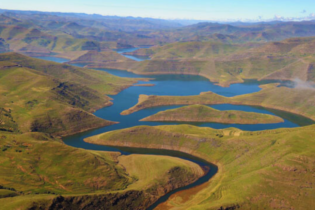In an increasingly capitalistic world, privatisation is becoming ever more common. There has been discussion over the last two decades; with the water lobby companies arguing that water is a need, while those in favour of a social society model defending the right of all to have access to water.
Since the 1970s multinationals interested in the water market have capitalised on the looming ‘water crisis’ and lobbied steadily to get the privatisation of water and sanitation accepted as the only solution for the management of this increasingly scarce resource. In the 1980s, the World Bank promoted greater involvement of the private sector in water management on a global scale. During the 1990s, the Washington Consensus (a model of economics rooted in the belief that a liberal market policy constitutes the one and only economic choice for the whole world) gained momentum.As a result, public water and sanitation management all but disappeared from the scene. Today, UN bodies, major bilateral agencies (EU, OECD), multilateral banks (IMF, African Development Bank) and many civil society organisations share the creed that mixed management models (so- called Private-Public-Partnerships) or even privatised management, is the solution for the water crisis. Unless the public becomes aware of the trend to commercialise water and sanitation, the present trend of privatisation will continue. It is therefore important that Batswana know and understand what is happening in their country, in their area, in their town. Since independence, water resources in Botswana have been predominantly the responsibility of public service. Even though provision was socially and spatially varied, many areas were with mains networks. As a result of the public ownership, water supplies were reliable and of fairly good quality. Now the Botswana government has embarked on an ambitious water sector reform project (2008-2013), which changes and defines the roles of major stakeholders, reviews the finances, tariffs and subsidies of the sector, and develops the water policy and Water Act. The National Water Conservation Policy has reorganised the water industry by removing it from Department of Water Affairs and local authority control, and transferred it to the state-owned Water Utilities Corporation (WUC). This has subsequently initiated and formalised the transformation of the water industry from a public service to a business organisation under the guise of economic efficiency and water quality as priorities. WUC will be responsible for the delivery of water services country wide. The claim by government is that selling off public water service to a corporation will ensure effective service and maintenance of the system. But behold, Botswana citizens are already showing concern about the prospect of this valuable and indispensable country asset being auctioned off by government through WUC. Since the management of water came under WUC, there has been concern from the people. Batswana are already complaining of poor service from WUC. They say the switch of management to the corporation was made without considering the varying socio-economic status of Batswana. For example, WUC has recently escalated water rates despite the fact that their service provision has badly affected most people. Most communities who relied on underground water can go for several weeks without supplies and yet their homes are said to be visited by WUC staff for regular meter readings and using the volumetric abstraction tariffs in billing the customers. Recently Marina and Bamalete Lutheran Hospitals have been going through a crisis because of water shortages. Unlike the defunct Water Affairs Department, WUC does not provide water infrastructure to new homesteads. They can only connect water to households within a 50-metre radius from the main line. Service under WUC will continue to be very problematic because of a number of factors. Difficulties are already arising over the financing of secondary pipelines and household connections. WUC ‘policy’ makes no difference between residents who are able to pay the fees and those who cannot afford them. According to the Botswana Core Welfare Index Survey (2009 – 2010), meeting basic needs in Botswana means having an income of P878.78 per month. An elderly pensioner receives only about P220 a month. As the main aim of private companies is to maximise profits, WUC will usually serve the needs of those who are able to pay as opposed to the needs of the majority and this further exacerbates socio-spatial inequality. A strict disconnection WUC ‘policy’ increases compliance, increases revenues and improves profits but it potentially denies vulnerable groups access to an essential life resource. It is even alleged that WUC abhors customers sharing water with their neighbours when the need arises. The water industry has changed from the ‘supply of a service to citizens at subsidised rates, towards the sale of a commodity to consumers on a full cost-recovery basis’. This is government violation of Vision 2016 goals and the spirit of Botho. It puts corporation rights and profits ahead of people’s need. Under this kind of set up, the poor and old will have stress. In 2005, the Centre for Applied Research was commissioned by Botswana government and UNDP to conduct a country scoping study to assess the current status of the water resources, planning and implementation in 2005. Findings from the study indicated the need to embrace the concepts of sustainable utilisation, affordability to all sectors of society, minimisation of water wastage, efficient use and access to sufficient and good quality water. The study recommended gender sensitive and participatory approach, pro-poor strategies in order to ensure that water management contributes to poverty reduction, full integration of climate change impacts and adaptive measures. The study argues for the need to promote water demand management and use of non-conventional water sources such as rainwater. It recommended the formulation of a National Policy on Rainwater Harvesting. Harvesting of rainwater could save the consumers and the country at large potable water that can then be used to serve more business and domestic consumers. Harvested rainwater could most easily be used for gardening and (car) washing. The study further argues for subsidies or tax incentives to ensure large scale adoption of rainwater harvesting under current conditions. It shows that a 10 percent reduction in water consumption through rainwater harvesting would lead to water savings of 5.1 mm3 p.a. and a net revenue decrease of P15.1 million for WUC (assuming unit production costs would not change). The study shows that water savings in terms of cubic metres could be used by WUC to serve other users and to postpone new infrastructure investments leading to capital costs savings.
The prevailing water situation in Botswana proves that government has not taken full regard of the recommendations stipulated in the study. Could the hastiness by government in transferring the management of water services to WUC been influenced by its signing of the Economic Partnership Agreements (EPAs)? EPAs, like other trade liberalisation agreements, effectively commodify natural resources, relegating them to the status of merchandise, rather than that of a public good that needs to be protected.
This new trade focus is conveniently in keeping with the European Union’s aggressive trade liberalisation objectives. EPA signatory governments who privatise water services are obliged to permit competitive bids from trans-national water-service corporations, thus opening the door to the commercial export of water. The Botswana Gazette (25 April 2012) reports that the European Union (EU), through Aquaplus Water Company from Belgium, has financed WUC with P2.85 million for wastewater management. Aquaplus leader, Herman De Schamphelaere, said at a meeting that Botswana was advised to embrace a model of water services based on a vertical integration. He is said to have stated that Aquaplus has 20 years experience in establishing all possible managerial skills in order to implement and guide this strategy towards 80 percent of compliance with EU directives. The reason for privatising water is that it has become big business. Water has now been subjected to the law of supply and demand. The major actors on the world water scene are the trans-national companies active in the water and sanitation sectors who see a chance for huge profits. International financial institutions promote the provision of services at commercial or ‘full cost recover’ rates and Public-Private-Partnerships, even making them a condition for granting debt relief or new loans. Fundamentally, trade liberalisation is about opening an increasing number of economic sectors to competition by limiting state intervention.Water companies maintain that they can provide solutions to the water crisis of the poor in developing countries. But so far, experience has proved that the claim is unfounded. In May 2001, after the IMF and World Bank policies led to an increase in water fees, three buckets of water cost a family in Ghana almost 20 percent of the daily minimum wage. In her essay on water privatisation, Victoria Stalker states that: “In the case of the UK, privatisation does not show that the private sector has absolute efficiency advantage”. A recent World Bank paper that examined efficiency concluded that: “Most cross-country papers on utilities find no statistically significant difference in efficiency scores between public and private providers”. There have been issues of leakages, such as in the case of Thames water, and several contamination incidences, such as in the case of Yorkshire water, and there are concerns that the rising water bills and increased disconnection rates are widening socio-spatial inequality. Liberalisation and privatisation of water and sanitation services leads to a loss of community involvement and the legitimate, democratic control of the water supply. It favours an extended formation of monopolies through company take-overs and mergers, increasing dependence on foreign investors, who invariably attempt to pass on their business risk to others. Privatisation of water services promotes a one-sided range of strategic options for water procurement and treatment based on economic criteria and interests. It disregards specialist expertise and traditional knowledge and undermines local interest in the protection and preservation of natural resources and sustainable resource management. Private companies often face conflict between profitability and service levels. They often over-react to short-term events by cutting back on maintenance or staff costs to minimise short-term losses. Workers retrenchments by the old Water Affairs Department and WUC are a case in point. In privatising the water industry, the government has divested itself of political responsibility for the rapid price increases associated with the high projected capital expenditures. This may be beneficial for the government but it can have detrimental effects on consumers as the public has little control over private companies, which do not have the social and moral responsibility to protect the needs of the general public. Public Services providing for essential needs of the people are an essential component of the society model. Hence, these services must remain under public sector management. Abandoning water and sanitation services solely to market forces will not guarantee their availability for the poor. Water is an irreplaceable source of life and must therefore be considered a common good for all of humanity.
Access to water is an undeniable human right for each person and each community. It is the duty of the public authorities to assure financial resources for the access for all, to sufficient clean water to provide for people’s basic needs. Beyond these minimal provisions, the cost of water should be borne by consumers according to the criteria of solidarity and the prevention of abuse or waste of water. Services for water for household use and basic sanitation cannot be considered equally as the use of water for industrial or agricultural activity. Solutions to the problem of access to water must therefore take into account, first and foremost, the well being of people. Water is an essential resource that cannot be left to the market forces. Neither can it be ruled by the paradigm of profit. Finally, there is a pressing need to improve transparency and accountability in relation to inter-governmental negotiations such as these, to ensure the development of agreements that fully reflect the needs of people.
Source: mmegi.bw






